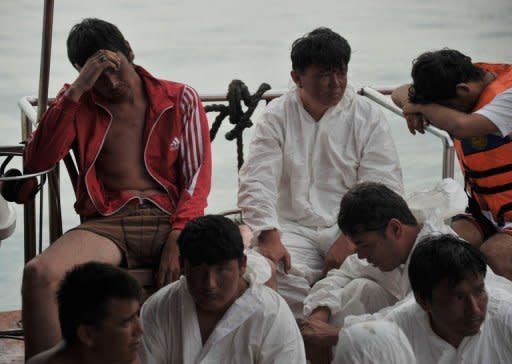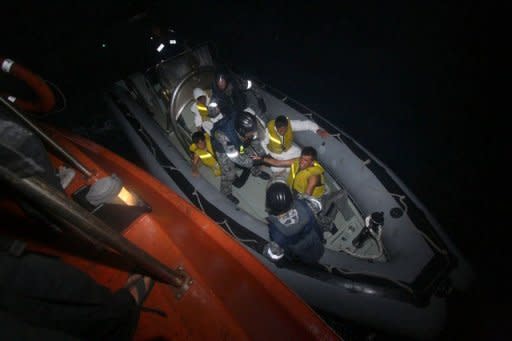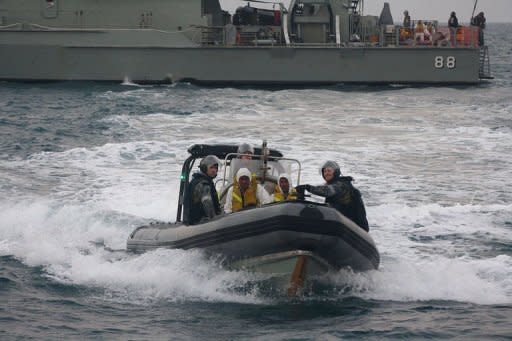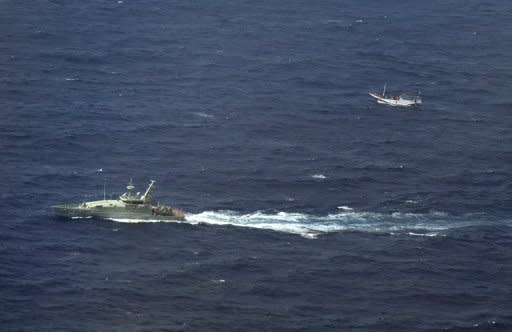Asylum-boat survivors 'watched others drown'
Asylum-seekers who spent over 24 hours in the ocean off Indonesia after their boat sank yelled fruitlessly at vessels for rescue and watched others carried away to drown, they said Friday. A total of 54 people -- mostly males and believed to be Afghan -- were plucked from the water after their rickety wooden boat broke up and sank early Wednesday as they tried to make their way to Australia. Hopes were fading Friday for around 100 more still missing. The Australian Maritime Safety Authority, which helped in the search, said it was calling off its rescue operation "following medical advice that there is no realistic prospect of survivability". The rescued asylum-seekers, most of whom were picked up by a cargo ship and an Australian naval vessel on Thursday evening, said their rickety boat was crewed by Indonesians, who put on life vests and fled when the boat got into trouble. Muhammad Reza, 30, who worked as an interpreter for US-led coalition forces in Afghanistan, spent his $16,000 life savings on the journey in hope of a better life. "The night before last, we kept fighting the waves, we were tired, without food without water; we drank sea water," he said. "We couldn't think of anything but how to keep ourselves alive." Muhammad Zahir, 25, said, "We were shivering and tired, and those who were too tired were taken away by the current. There were also women, young girls and boys." Survivors said the boat began to leak and sent out a distress signal at a point believed to be about eight nautical miles from the main Indonesian island of Java, before strong waves shattered it. Indonesia sent out rescue crews, but they abandoned the search after about 10 hours, saying they could find no sign of a sunken vessel. "As far as I could tell, everyone was still alive after the boat broke up," Muhammad Ali, 53, told AFP. "We saw Indonesian boats circling around for four or five hours and we kept shouting 'Help! Help!' but they didn't see us. "If only they had come, more of us would have been saved." The survivors -- who include a boy looking around 10 years old -- were later transferred onto Indonesian rescue boats and brought into the port of Merak, in western Java, on Friday, amid scenes of anguish and despair at grown men wailed in grief for relatives and friends lost at sea. Some of the survivors appeared dehydrated and the group, wearing identical white coveralls, at first refused to get off. A few wept hysterically, shouting: "We want to go to Australia!" They eventually all disembarked, with some taken by ambulance to hospital. Most of the others, their faces sunburnt, were taken to the rundown Feri Merak Hotel, where some collapsed on beds from fatigue, while others answered reporters' questions in whispers, hardly able to speak. A 17-year-old ethnic Hazara who identified himself only as Esmatullah, said he had paid $5,500 for the hazardous boat journey. "I want to be in Australia, I want to work there, I want to study because if I don't my own future and that of my sisters and family back home will be nothing but darkness," he said from his sparsely furnished hotel room. In other rooms, one man on a bed, tightly clutching his head with his hands; another massaged his own tired limbs as he groaned in pain; one survivor lay curled in a fetal position in a room with a broken air conditioner, mumbling he was ill and calling for a doctor. Indonesian authorities said they would continue to look for more survivors for a few days more. In Australia, the Sydney Morning Herald newspaper reported that the asylum vessel was organised by a 25-year-old Pakistani people-smuggler. Australian Prime Minister Julia Gillard defended Indonesia's handling of the initial aborted rescue. "I believe that the Indonesians did the best that they could," she said. "This should reinforce the message about how dangerous these journeys are, it's a big ocean, it's a dangerous ocean. We've seen too many people lose their lives trying to make the journey to Australia." Australia is facing a steady influx of asylum-seekers arriving by boat, many of whom use Indonesia as a transit hub, paying people-smugglers for passage on wooden vessels after fleeing their home countries. Two weeks ago, Canberra announced its intention to transfer asylum-seekers to Nauru and Papua New Guinea in the Pacific as part of a tough new policy to deter them from making the dangerous sea voyage. More than 300 boatpeople have died en route to Australia this year, with vessels being intercepted by the Australian navy on almost a daily basis, including one carrying 31 people late Thursday.






